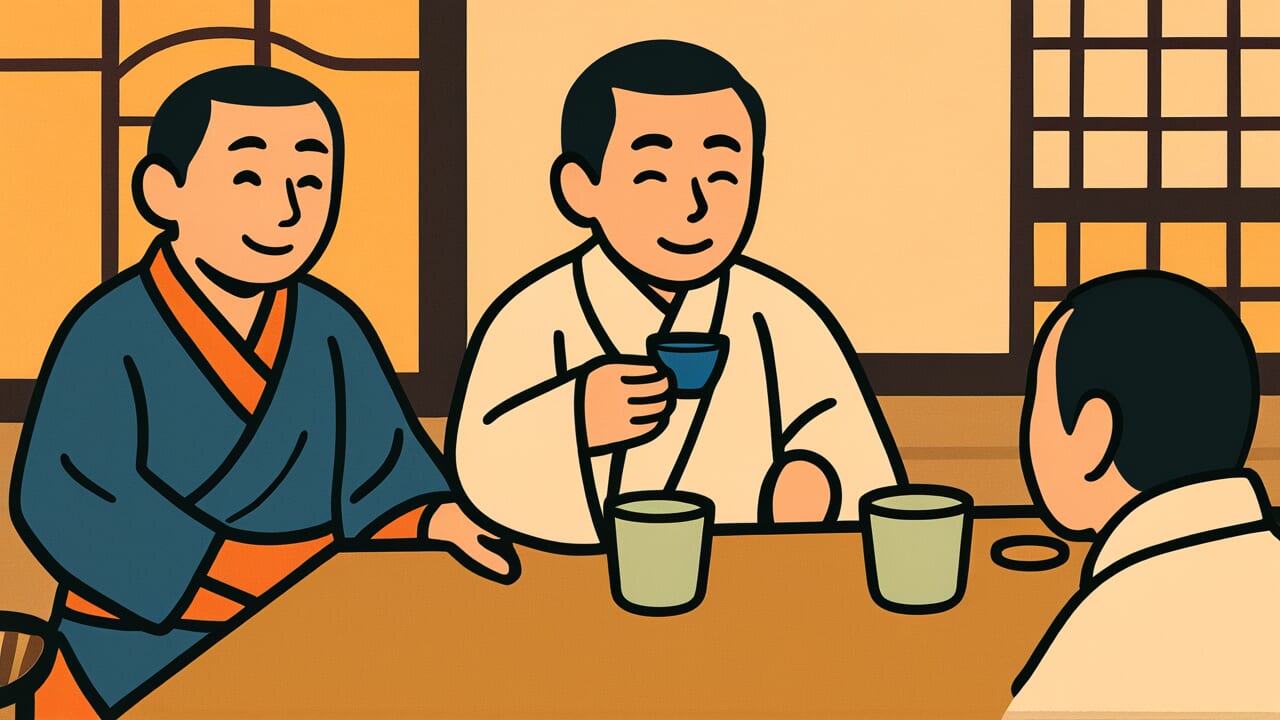How to Read “Three cups for the host, one cup for the guest”
Teishu sanbai kyaku ippai
Meaning of “Three cups for the host, one cup for the guest”
This proverb teaches that a host should be modest and put guests first when entertaining them.
When you invite guests, you shouldn’t focus on enjoying food and drink yourself. Instead, you should make sure your guests feel comfortable.
The host offers food, keeps conversation lively, and pours tea. The host constantly moves around taking care of guests.
As a result, the host has little time to eat or drink leisurely.
People use this proverb when teaching hospitality manners or explaining how a host should behave. It shows that true hospitality means prioritizing guest satisfaction over your own enjoyment.
Even today, you can understand this proverb’s meaning at home parties or dinners. Watch the host busily working while barely eating anything themselves.
Origin and Etymology
No clear written records explain this proverb’s origin. However, experts believe it came from tea ceremony etiquette and hospitality customs during the Edo period.
The contrast between “three cups” and “one cup” refers to servings of tea or sake. At first glance, it seems the host drinks three cups while only offering one to the guest.
But this is actually a paradoxical expression. It means the host takes enough time to drink three cups while carefully serving the guest’s single cup.
In traditional Japanese hospitality culture, hosts always consider guest comfort first. Putting themselves second was considered a virtue.
The host offers the next cup before the guest’s cup empties. They serve dishes matching the meal’s pace. They work hard to make conversation enjoyable.
With such detailed attention, the host has no time to eat or drink leisurely.
This saying captures the Japanese spirit of hospitality. True hospitality means the host restrains themselves to prioritize guests.
Behind the surface contrast of numbers lies a deep spirit of consideration.
Usage Examples
- Today’s party follows “Three cups for the host, one cup for the guest” – let’s focus only on making guests happy
- She embodied “Three cups for the host, one cup for the guest” by not eating and constantly attending to guests
Universal Wisdom
“Three cups for the host, one cup for the guest” asks us a deep question about true richness. This proverb has survived because it reveals a truth about human happiness.
Our happiness doesn’t come from satisfying only ourselves.
We instinctively want to satisfy our own desires first. If there’s delicious food, we want to eat it. If there’s fun to be had, we want to enjoy it.
These are natural feelings. But this proverb shows another form of happiness.
It’s the deeper satisfaction that comes from putting someone else before yourself.
When guests truly rejoice and leave satisfied, the host feels fulfillment beyond any full stomach. This might be a special human ability.
We can feel others’ happiness as our own joy. It may look like self-sacrifice, but it’s actually the richest way to taste life.
This proverb shows a paradox. The giver actually receives the most. The joy of hospitality, the fulfillment of serving others, the happiness of receiving gratitude.
These are treasures you can never obtain by living only for yourself. Our ancestors packed this deep human understanding into a simple contrast of cup numbers.
When AI Hears This
The host drinking more than the guest is actually a strategy to gain trust by paying an “unfakeable cost.” In game theory, verbal promises are easily broken and therefore not trusted.
What matters is bearing a “high cost” that liars cannot imitate.
For example, male peacocks have huge tail feathers. This proves they have excellent genes that can survive despite such a burden.
Similarly, the host drinking three cups carries certain costs: getting drunk, health risks, and tea consumption. If someone is just showing off without real hospitality capacity, these costs hurt badly.
Only those with genuine capacity can perform this act.
The asymmetry of the guest drinking only one cup is interesting. The guest signals “I’ve received your sincerity” while showing consideration by not burdening the host further.
Two-way signal exchange builds trust without words.
Modern companies investing huge amounts in advertising follow the same principle. By making investments they cannot easily withdraw from, they demonstrate their commitment to long-term business.
Lessons for Today
This proverb teaches you “the courage to become the giver.” Every day, we choose how to use our time, energy, and resources.
Naturally, we want to use them for ourselves. But sometimes, consciously put someone else before yourself.
It doesn’t need to be dramatic. At dinner with friends, listen to their stories instead of talking about yourself. Adjust your schedule for your family.
At work, spend time helping junior colleagues grow. These small choices accumulate and enrich your life.
Modern society overflows with words like “be yourself” and “take care of yourself.” That’s important too. But this proverb teaches another truth.
The best way to take care of yourself might actually be taking care of someone else.
When you become the host, you might feel tired at first. But when you see their smile, when you receive heartfelt gratitude, something warm spreads inside you.
That’s exactly why this proverb has been passed down for hundreds of years.



Comments